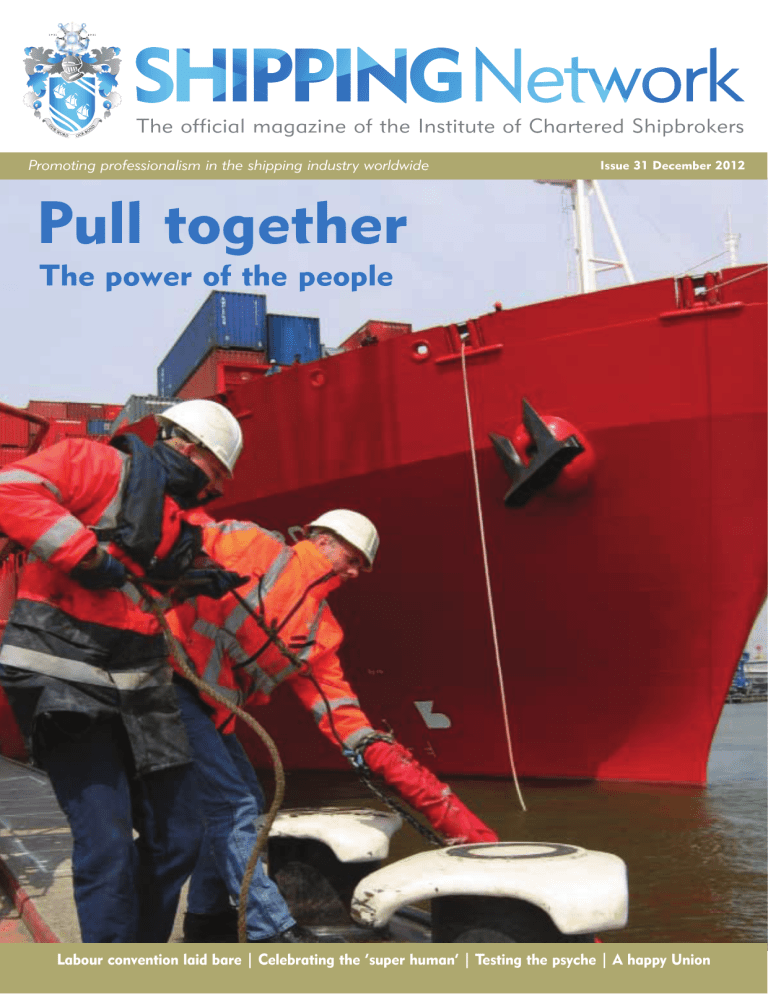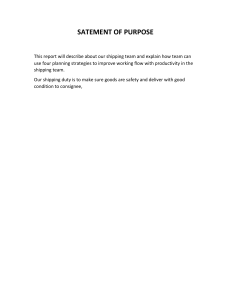
The official magazine of the Institute of Chartered Shipbrokers Promoting professionalism in the shipping industry worldwide Issue 31 December 2012 Pull together The power of the people Labour convention laid bare | Celebrating the ‘super human’ | Testing the psyche | A happy Union DECEMBER 2012 Contents Beating the machine Increasing automation in our industry is viewed as the answer to tackling the longstanding human error challenge. But as machines wage war over man, should we be taking a step back from the front line? As Cardinal Marine Point’s Mike Powell rightly points out on Page 12 of this issue of the Shipping Network, over-reliance on technology means we could miss the human potential to make sure things “go right or even super-right”. It’s true that there is a tendency to dwell on the negatives and incidents that have been caused by human error only serve to feed that focus. But if we took the time, there would surely be many examples of seafarers relying on Building leaders counts for a great deal experience to intervene and avoid a catastrophe, brokers sniffing out a potential problem that if left unchecked could have been damaging for reputations or commissions, or agents stepping in to avert a crisis before anyone involved even realised a crisis was brewing. Technology propels us on, but without the human element where would we really be? Our people, in all sectors, on and offshore, make the shipping industry the success it is today. This people-themed issue of the Shipping Network celebrates the human element in shipping, something that we do not, as an industry, do often enough. Carly Fields, FICS Editor 1 Institute director Julie Lithgow explains the importance of nurturing leadership skills as Institute president Robert Woods flies the flag for the ICS community Shipping workers take centre stage 4 ISAN’s David Dearsley asks what the Maritime Labour Convention means for the shipping industry Getting the message to the right people 8 The Mission to Seafarers’ Ben Bailey asks who is going to explain the rights afforded by the MLC to seafarers The first chapter of a long-awaited process 11 The ITF’s Jon Whitlow explains why he has high hopes for the Maritime Labour Convention There is still a place for the ‘super’ human 4 12 Cardinal Point Marine’s Mike Powell explains why we need to focus on the human element Stop waiting for something to happen 15 Spinnaker’s Phil Parry explains why shipping employees need to take control of their own destiny Testing times improve employee selection 16 Faststream Recruitment’s Mark Charman discusses a more intelligent approach to hiring Gatekeepers of the global supply chain 18 8 Warrant Group’s Joe McGuffie explains why today’s port agents need a new skill set Perfecting the art of compromise 20 IMEC’s Thomas Axelsen discusses how to unite maritime unions and employers Gone fishing for a change in culture 22 PSA International’s Caroline Lim discusses a rewards policy with a difference Build connections, keep the edge SPNL’s Claudio Chiste explains why it’s not who you know, it’s who knows you in shipping 2 24 16 INSTITUTE OF CHARTERED SHIPBROKERS – SHIPPING NETWORK People special Connections Build connections, keep the edge SPNL’s Claudio Chistè explains why it’s not who you know, it’s who knows you in shipping T Claudio Cristè oday’s younger generation, referred to as “Generation Y” (or Gen-Y) and broadly defined as those in their twenties and thirties, live in a technological age that goes beyond anything the previous generation faced. The advancement of technologies has been a game changer in the way people get connected with the ‘right’ people. In my capacity as SPNL chairman, London’s networking forum for young shipping professionals (aimed primarily at GenY), I was recently invited to talk at a conference focussing on issues for young seafarers including the need for a structured career path, proper training and mentoring, and how best to achieve a work-life balance. An overriding theme – present in all these issues – was the different generational attitudes towards the use of technology. It is clear that the younger generation has adapted with greater ease to the use of latest technology than the older generation, which has raised concerns that the development of advanced navigation tools (that aim to diminish human error from bridge work) may lead to over-reliance on technology, complacency and the risk of new types of accidents at sea. While the key focus of the conference was on the use of technology as a navigational aid and as a means of communication at sea, social media was also raised. Since 2008, social media has become the buzz phrase in the corporate world. Today, the influence of technology on both social network society and communities is ever increasing. These two distinct types of environments are often used interchangeably, but they are very different. The single most important feature that distinguishes a social network from a community is how people are held together on these sites. While technology can facilitate networking, it shouldn’t replace face-to-face meetings 24 Networking has always been an important part of shipping business RELATIONSHIP RULES In a social network, whether online or offline, people are assembled by pre-established interpersonal relationships, such as classmates, neighbours, colleagues, business partners, relatives, friendship, etc. The connections are built one at a time (i.e. you connect directly with another user). The primary enabler is to maintain relationships and establish new ones to expand the network, whereas with a community, be it offline or online, a shared objective/passion brings people together with a relationship developing thereafter. In this context, it should be obvious why Facebook, MySpace and LinkedIn are social networks as opposed to communities. For its part, the Shipping Professional Network in London operates as a catalyst to ensure you meet the ‘right’ people to include in your network and expand your sphere of influence. London’s young shipping community itself is very diverse; there is an opportunity to harness the resources of like-minded young shipping professionals. This diversity is reflected by the professions represented on the SPNL Board. SPNL provides a platform to ‘connect’ with like-minded professionals. Ultimately, it’s not about who you know, but who knows you! It is not about simply handing out business cards, or even accumulating ‘friends’ via social media, but an ability to build effective relationships. In the process of networking, form is as important as substance. For each event, one should be armed with business cards, and look the part. An African proverb sums this up: ‘The way you dress, is the way you will be addressed’. Networking concerns two key issues: how you establish new relationships and how you maintain effective and ongoing relationships. It is important not to be a superficial social climber looking to connect with the ‘who’s who’, but to be genuinely interested in engaging with like-minded professionals. INSTITUTE OF CHARTERED SHIPBROKERS – SHIPPING NETWORK People special Connections As you build your solid network of contacts make sure that you are generous with those who deserve your time. If it is within your capabilities, offer help to others who need it and it will eventually come back to you tenfold. Even if you help someone and there is no reward, always do your best work because you leave behind the imprint of your reputation. The more positive the effect on our surroundings the more there will be induced positive effects. When you project a professional attitude you will attract like-minded professionals. As experience is gained, it is easier to identify the serious professionals from your networking circle. The professionals are the ones who you want to keep as contacts. GET TOGETHER There is a long tradition within the shipping community of encouraging social as well as financial returns, as displayed by ICS’s promotion of professionalism. SPNL would like to build on this foundation, by seeking to bring young professionals together from all aspects of shipping, in a social yet professional environment. This provides an opportunity to establish industry contacts outside of your close network of familiarity, which may be directly or indirectly involved in your day-to-day job. Being equipped with a breadth and depth of contacts – which you would not have otherwise had the chance to meet personally through the ordinary course of business – is the first step in establishing meaningful relationships for the future. Why is networking important especially for young professionals? Business is based on trust. Trust in turn can be built through personal relationships. The two benefits of starting networking early in your career are: l Strong relationships take time. Quality relationships take time to build and get stronger over time. They cannot be maintained without regular communication. Meeting people early in their careers, when they are typically more junior in their roles, is arguably easier in the sense that the connection is made with the individual rather than the status. People do business with people they like, trust, confide in and feel comfortable around. l Peer preference. People tend to feel most comfortable with others in their age group. Typically, a range of five to seven years on either side of a person’s age creates an atmosphere of compatibility. However, age may not necessarily come into play: people who share common interests transcend most age barriers. Networking has always existed, but only lately has it become one of the most powerful and efficient ways of getting people together rather than mere expression. The reason is mainly technology. With new forms of communication and information the network is both centralised and decentralised, and able to be managed without a real core. Future generations should process INSTITUTE OF CHARTERED SHIPBROKERS – SHIPPING NETWORK Starting effective networking early on in a shipping career can pay dividends later these changes and transform them inside the reality of their sectors alongside traditional organisational methods. SN Claudio Chistè MICS is the SPNL chairman, and works in the Shipping & Marine Finance team at Investec Bank plc. For more information go to www.spnl.co.uk “It is not about simply handing out business cards, or even accumulating ‘friends’ via social media, but an ability to build effective relationships” Making the right connections There are many tricks of the trade when it comes to successful networking. These seven skills will enhance your effectiveness in building and making relations of mutual benefit: 1. Do your research (if you are attending a theme-based event read about the topic beforehand) 2. Be able to express who you are and a bit about your background in under two minutes, the so-called elevator pitch (concise, carefully planned and well practiced description of who you are, being specific about what you offer to establish if there is any scope for mutual benefit, whether immediate or possible) 3. Actively listen 4. Build and expand the dialogue on a common connection. Maintain eye contact, be courteous and be yourself, which is key. Not maintaining eye contact could give the impression that you are eyeing up the next target or that the canapé on the passing tray is more interesting than what the person has to say 5. Build rapport. The ICS’ motto ‘our word, our bond’ is critical to gain trust and establish your reputation 6. Organise your contacts (having business cards without having any recollection of the person renders the contact ineffective) 7. Follow-up! After an event, send a follow-up email. If you decide to add someone on LinkedIn after you have met them, make the effort to personalise this by sending a personalised message with your invitation. SN 25



